Abstract
The degree and nature of patient involvement in consultations with health professionals influences problem and needs recognition and management, and public accountability. This paper suggests a framework for understanding the scope for patient involvement in such consultations. Patients are defined as co-producers of formal health services, whose potential for involvement in consultations depends on their personal rights, responsibilities and preferences. Patients' rights in consultations are poorly defined and, in the National Health Service (NHS), not legally enforceable. The responsibilities of patients are also undefined. I suggest that these are not to deny, of their own volition, the rights of others, which in consultations necessitate mutuality of involvement through information-exchange and shared decision-making. Preferences should be met insofar as they do not militate against responsibilities and rights.
Full text
PDF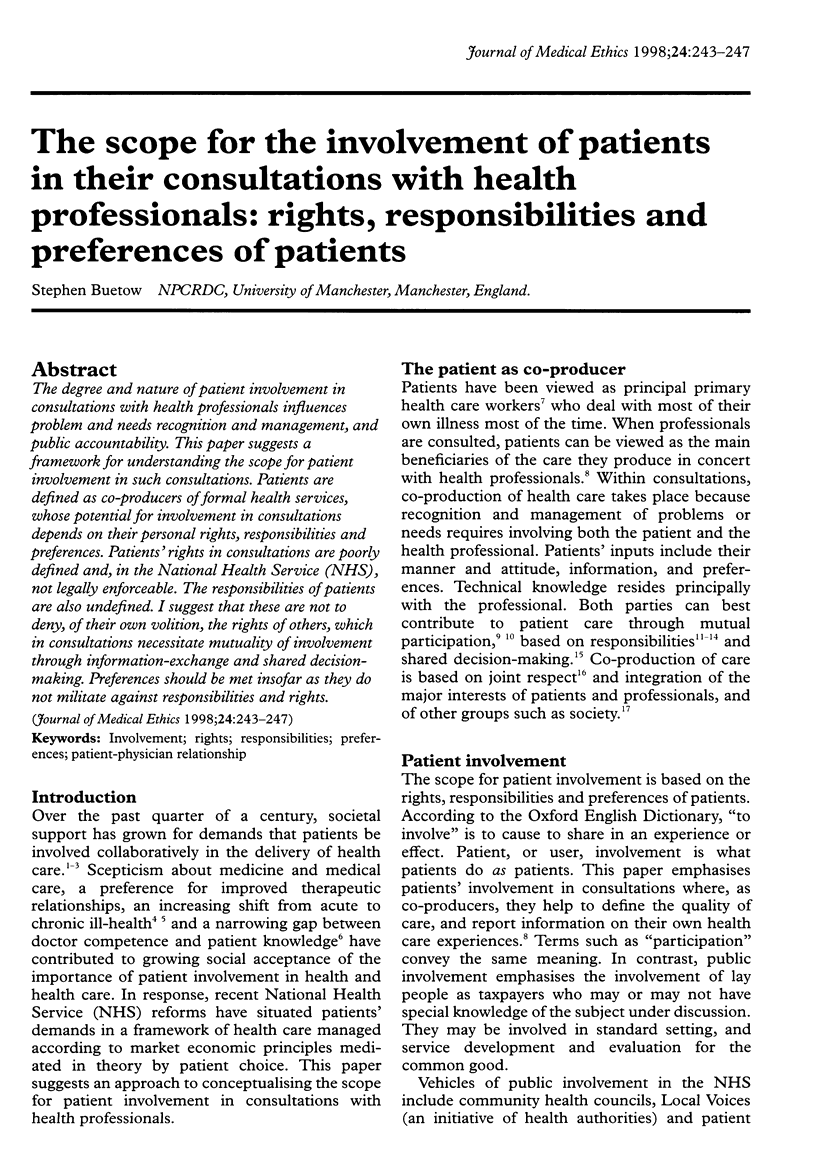
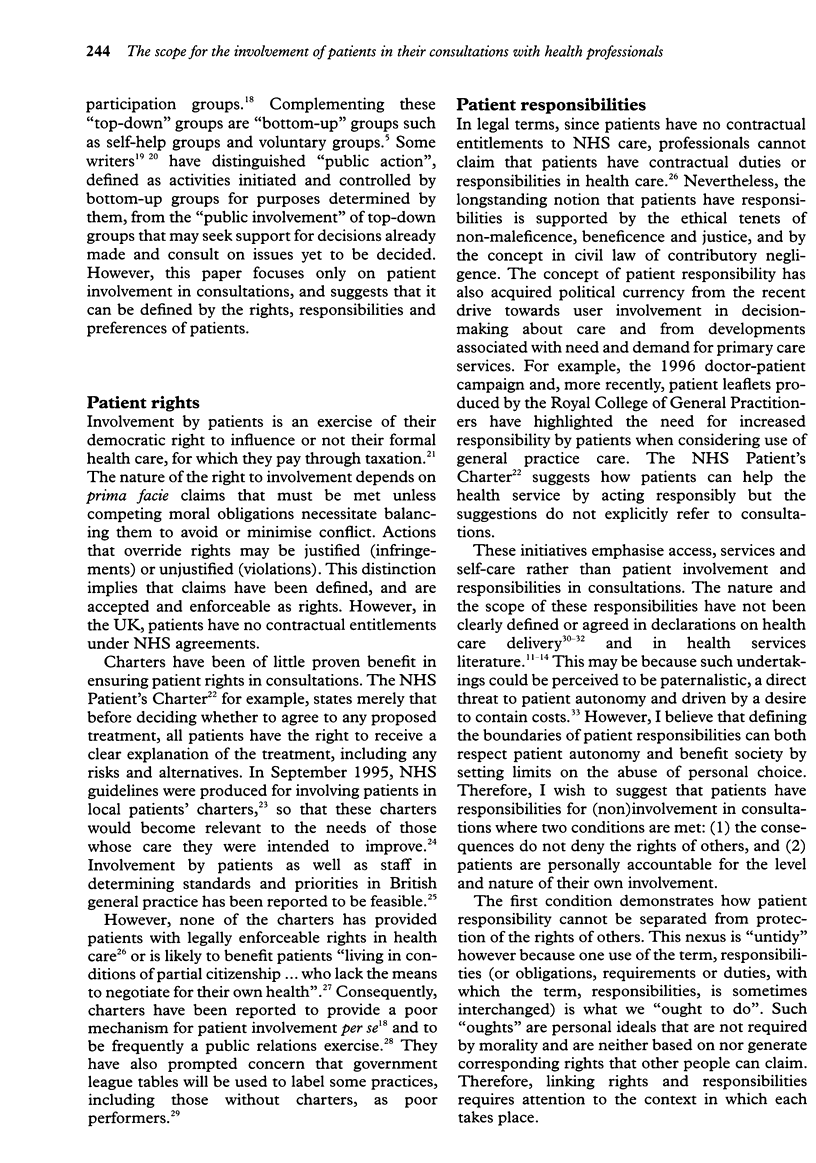
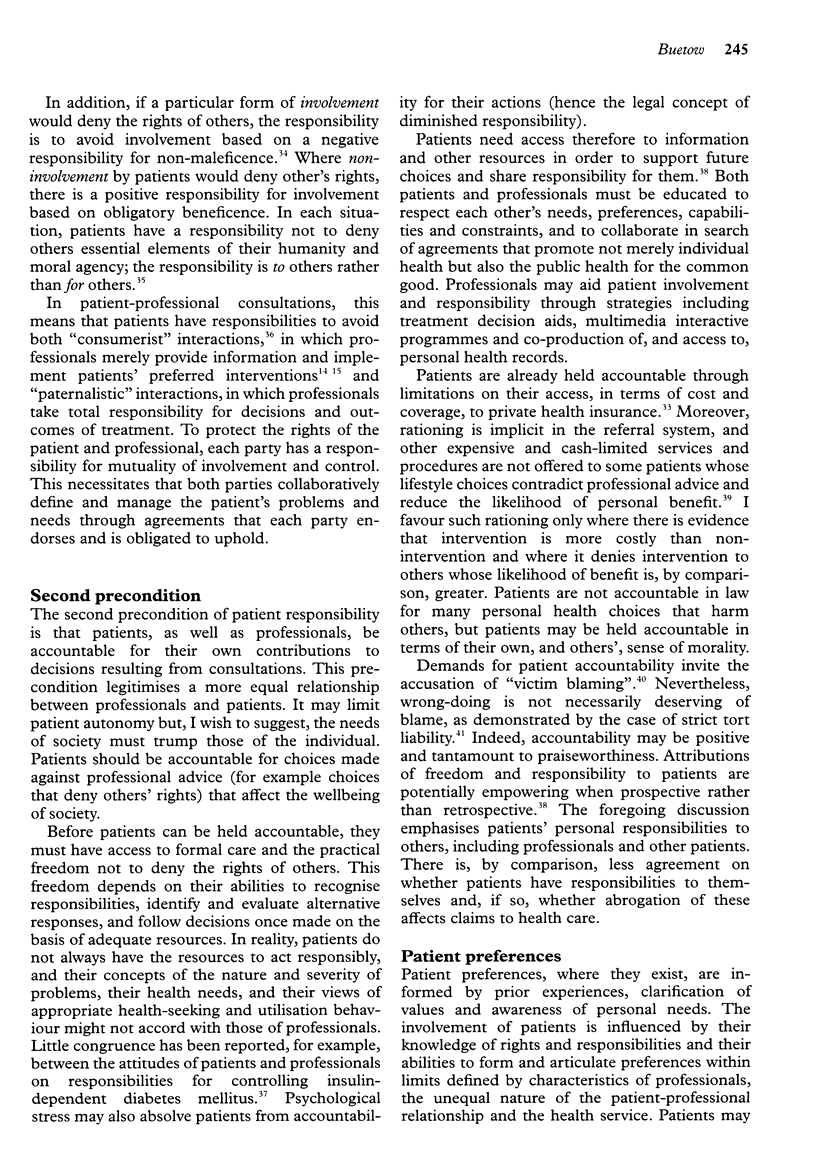
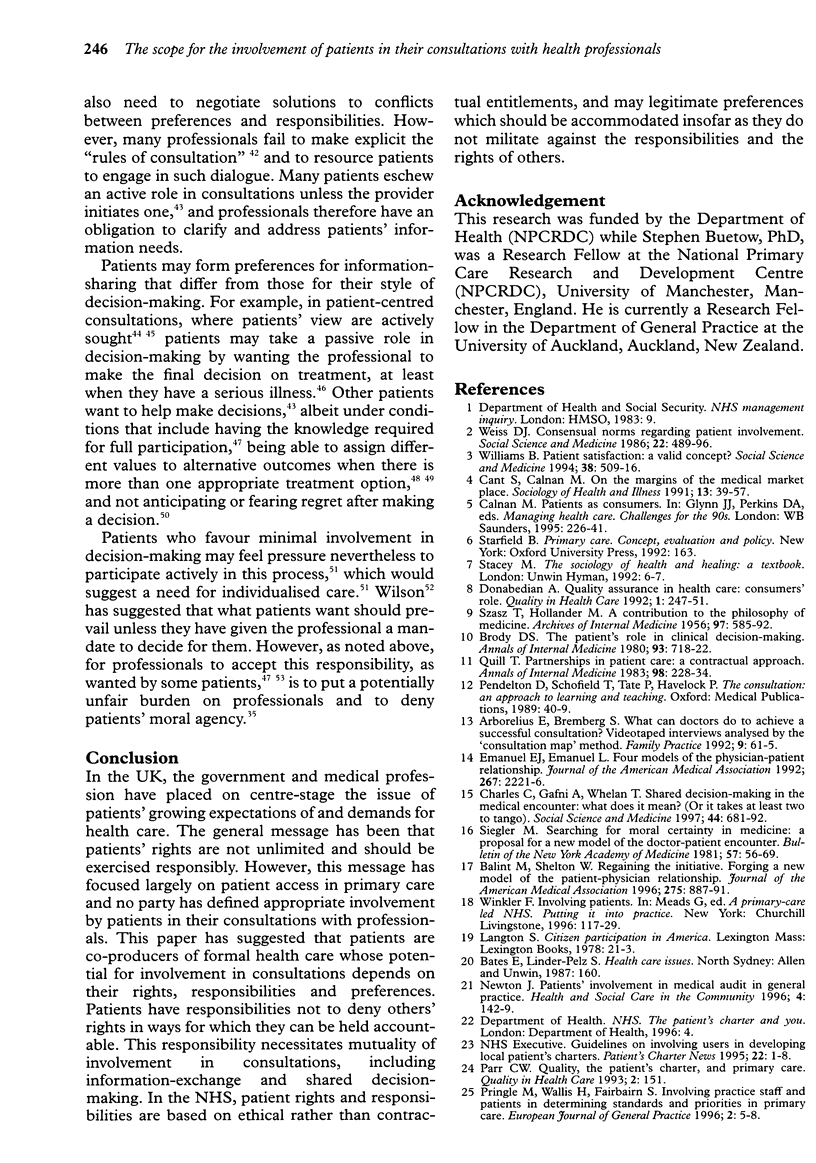
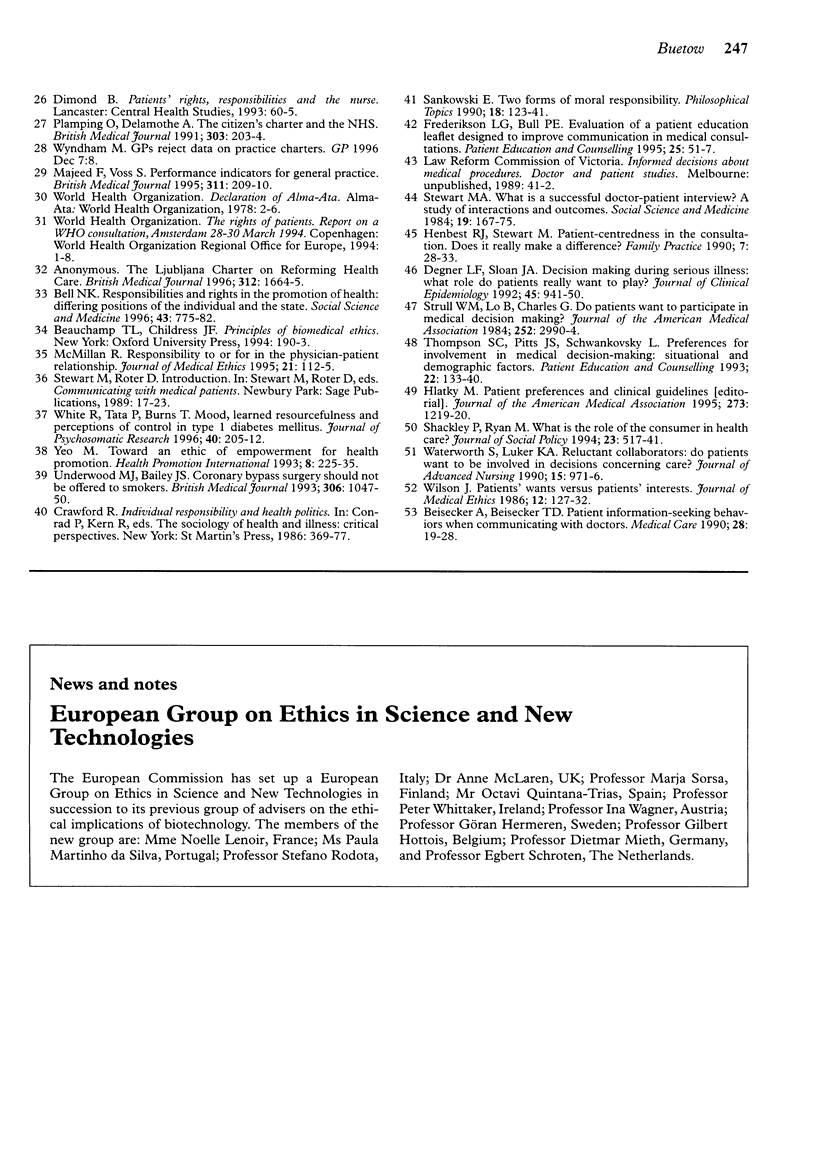
Selected References
These references are in PubMed. This may not be the complete list of references from this article.
- Arborelius E., Bremberg S. What can doctors do to achieve a successful consultation? Videotaped interviews analysed by the 'consultation map' method. Fam Pract. 1992 Mar;9(1):61–66. doi: 10.1093/fampra/9.1.61. [DOI] [PubMed] [Google Scholar]
- Balint J., Shelton W. Regaining the initiative. Forging a new model of the patient-physician relationship. JAMA. 1996 Mar 20;275(11):887–891. doi: 10.1001/jama.275.11.887. [DOI] [PubMed] [Google Scholar]
- Beisecker A. E., Beisecker T. D. Patient information-seeking behaviors when communicating with doctors. Med Care. 1990 Jan;28(1):19–28. doi: 10.1097/00005650-199001000-00004. [DOI] [PubMed] [Google Scholar]
- Bell N. K. Responsibilities and rights in the promotion of health: differing positions of the individual and the state. Soc Sci Med. 1996 Sep;43(5):775–782. doi: 10.1016/0277-9536(96)00122-0. [DOI] [PubMed] [Google Scholar]
- Brody D. S. The patient's role in clinical decision-making. Ann Intern Med. 1980 Nov;93(5):718–722. doi: 10.7326/0003-4819-93-5-718. [DOI] [PubMed] [Google Scholar]
- Charles C., Gafni A., Whelan T. Shared decision-making in the medical encounter: what does it mean? (or it takes at least two to tango). Soc Sci Med. 1997 Mar;44(5):681–692. doi: 10.1016/s0277-9536(96)00221-3. [DOI] [PubMed] [Google Scholar]
- Degner L. F., Sloan J. A. Decision making during serious illness: what role do patients really want to play? J Clin Epidemiol. 1992 Sep;45(9):941–950. doi: 10.1016/0895-4356(92)90110-9. [DOI] [PubMed] [Google Scholar]
- Donabedian A. The Lichfield Lecture. Quality assurance in health care: consumers' role. Qual Health Care. 1992 Dec;1(4):247–251. doi: 10.1136/qshc.1.4.247. [DOI] [PMC free article] [PubMed] [Google Scholar]
- Emanuel E. J., Emanuel L. L. Four models of the physician-patient relationship. JAMA. 1992 Apr 22;267(16):2221–2226. [PubMed] [Google Scholar]
- Frederikson L. G., Bull P. E. Evaluation of a patient education leaflet designed to improve communication in medical consultations. Patient Educ Couns. 1995 Feb;25(1):51–57. doi: 10.1016/0738-3991(94)00696-j. [DOI] [PubMed] [Google Scholar]
- Henbest R. J., Stewart M. Patient-centredness in the consultation. 2: Does it really make a difference? Fam Pract. 1990 Mar;7(1):28–33. doi: 10.1093/fampra/7.1.28. [DOI] [PubMed] [Google Scholar]
- Hlatky M. A. Patient preferences and clinical guidelines. JAMA. 1995 Apr 19;273(15):1219–1220. [PubMed] [Google Scholar]
- Majeed F. A., Voss S. Performance indicators for general practice. BMJ. 1995 Jul 22;311(6999):209–210. doi: 10.1136/bmj.311.6999.209. [DOI] [PMC free article] [PubMed] [Google Scholar]
- McMillan R. C. Responsibility to or for in the physician-patient relationship? J Med Ethics. 1995 Apr;21(2):112–115. doi: 10.1136/jme.21.2.112. [DOI] [PMC free article] [PubMed] [Google Scholar]
- Newton John. Patients' involvement in medical audit in general practice. Health Soc Care Community. 1996 May;4(3):142–149. doi: 10.1111/j.1365-2524.1996.tb00058.x. [DOI] [PubMed] [Google Scholar]
- Parr C. W. Quality, the patient's charter, and primary care. Qual Health Care. 1993 Sep;2(3):151–151. doi: 10.1136/qshc.2.3.151. [DOI] [PMC free article] [PubMed] [Google Scholar]
- Plamping D., Delamothe T. The citizen's charter and the NHS. BMJ. 1991 Jul 27;303(6796):203–204. doi: 10.1136/bmj.303.6796.203. [DOI] [PMC free article] [PubMed] [Google Scholar]
- Quill T. E. Partnerships in patient care: a contractual approach. Ann Intern Med. 1983 Feb;98(2):228–234. doi: 10.7326/0003-4819-98-2-228. [DOI] [PubMed] [Google Scholar]
- Siegler M. Searching for moral certainty in medicine: a proposal for a new model of the doctor-patient encounter. Bull N Y Acad Med. 1981 Jan-Feb;57(1):56–69. [PMC free article] [PubMed] [Google Scholar]
- Stewart M. A. What is a successful doctor-patient interview? A study of interactions and outcomes. Soc Sci Med. 1984;19(2):167–175. doi: 10.1016/0277-9536(84)90284-3. [DOI] [PubMed] [Google Scholar]
- Strull W. M., Lo B., Charles G. Do patients want to participate in medical decision making? JAMA. 1984 Dec 7;252(21):2990–2994. [PubMed] [Google Scholar]
- Thompson S. C., Pitts J. S., Schwankovsky L. Preferences for involvement in medical decision-making: situational and demographic influences. Patient Educ Couns. 1993 Dec 31;22(3):133–140. doi: 10.1016/0738-3991(93)90093-c. [DOI] [PubMed] [Google Scholar]
- Underwood M. J., Bailey J. S. Coronary bypass surgery should not be offered to smokers. BMJ. 1993 Apr 17;306(6884):1047–1048. doi: 10.1136/bmj.306.6884.1047. [DOI] [PMC free article] [PubMed] [Google Scholar]
- Waterworth S., Luker K. A. Reluctant collaborators: do patients want to be involved in decisions concerning care? J Adv Nurs. 1990 Aug;15(8):971–976. doi: 10.1111/j.1365-2648.1990.tb01953.x. [DOI] [PubMed] [Google Scholar]
- Weiss S. J. Consensual norms regarding patient involvement. Soc Sci Med. 1986;22(4):489–496. doi: 10.1016/0277-9536(86)90053-5. [DOI] [PubMed] [Google Scholar]
- White R., Tata P., Burns T. Mood, learned resourcefulness and perceptions of control in type 1 diabetes mellitus. J Psychosom Res. 1996 Feb;40(2):205–212. doi: 10.1016/0022-3999(95)00515-3. [DOI] [PubMed] [Google Scholar]
- Williams B. Patient satisfaction: a valid concept? Soc Sci Med. 1994 Feb;38(4):509–516. doi: 10.1016/0277-9536(94)90247-x. [DOI] [PubMed] [Google Scholar]
- Wilson J. Patients' wants versus patients' interests. J Med Ethics. 1986 Sep;12(3):127–132. doi: 10.1136/jme.12.3.127. [DOI] [PMC free article] [PubMed] [Google Scholar]



